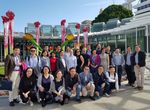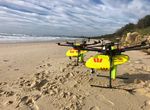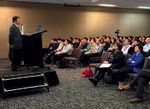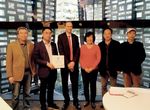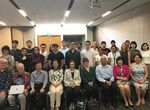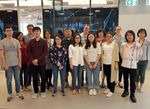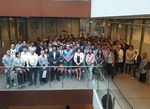Australian Artificial Intelligence Institute - University of ...
←
→
Page content transcription
If your browser does not render page correctly, please read the page content below
The Australian
Artificial
Intelligence
Institute
The Australian Artificial Intelligence Institute Fellow, two FIEEE Fellows, one highly cited
(AAII) is a world-leading research institutein researcher, three future fellows and five DECRAs,
artificial intelligence, with an ambition to ten postdocs, and more than 190 PhD students.
develop theoretical foundations and advanced
Over the past three years, AAII members have
algorithms for artificial intelligence, and to
won 23 Australian Research Council (ARC)
drive significant progress in related areas like
projects, including ARC Discovery, Linkage,
computational intelligence, computer vision,
Future Fellow, Laureate Fellow and Discovery
network analysis, data science, machine
Early Career Research Awards, together with
learning, pattern recognition, bioinformatics,
50 national and international industry projects.
brain-computer interface, social robotics,
and intelligent information systems. Since its inception as CAI in March 2017, AAII
staff have published more than 1000 papers,
In Australia, AAII has become the largest
with over 450 of those being in high reputational
research hub in the field of artificial intelligence.
international journals. Furthermore, AAII
AAII was transformed from the Centre of
core members have delivered more than
Artificial Intelligence (CAI) to an institute in 2020,
20 keynote presentations in national and
based on its highly successful broad-scope AI
international conferences, and AAII students
research. Incorporating eight research labs,
have received several best paper awards
AAII currently has 34 academic staff. Among
from leading journals and conferences,
its staff, the institue boasts four Distinguished
including national and international awards.
Professors, one ARC Laureate Fellow, one FTSE
234STAFF
190
PHD STUDENTS
10
POST DOCS
8
RESEARCH LABS
Members of the Australian Artificial Intelligence Institute
3University of Technology Sydney
Launch of the Australian
Artificial Intelligence Institute
The Australian Artificial Intelligence Institute (AAII) was officially
launched at a virtual forum on Friday 7 August 2000 by the
Hon. Karen Andrews, Minister for Industry, Science and
Technology, Australia.
Professor Michael Blumenstein (ADR Research Strategy and
Management, FEIT) acted as the Master of Ceremonies for the
online event, which was attended by more than 150 local and
international guests from universities, government and industry to
support AAII’s promotion from a Centre to an Institute.
Distinguished Professor Jie Lu, the Director of the AAII gave
a welcome speech highlighting the the centre of Artificial
Intelligence (CAI)’s outstanding achievements over the last three
years and the significant research impact that over 200 CAI staff
and students are proud of. She particularly outlined the vision,
goals and strategies of the AAII institute and mentioned the
inauguration of her ARC Laureate Fellowship Award.
Professor Michael Blumenstein, Associate Dean (Research Strategy and The welcome speech was followed by an address by the Hon. Karen
Managment) began proceedings as Master of Ceremonies to welcome Andrews MP (Minister for Industry, Science and Technology), who
participants to AAII’s Virtual Launch discussed Australia’s opportunities with AI and the government’s
plans to develop AI capabilities and capacity in Australia.
“Our goal is to make AAII a first class institute
in the area of AI in the world by creating
an exeptional research environment;
recruiting outstanding researchers;
produgcing high impact research;
collaborating with AI researchers and
practicers nationally and internationally;
and nurturing a culture of innovation,”
DISTINGUISHED PROFESSOR JIE LU
Director, Australian Artificial Intelligence Institute
University of Technology Sydney
“As a government we are looking to artificial
intelligence as a means to growing our
Australian economy to developing our
industries and to truly become world
leading in a number of our sectors,”
HON KAREN ANDREWS
Minister for Industry, Science and Technology
4Australian Artificial Intelligence Institute
“I have no doubt that AAII will produce excellent
research in a range of areas including
healthcare, transportation, agriculture,
telecommunications, and all will have real
and concrete benefits for Australia,”
PROFESSOR ATTILA BRUNGS
Vice-Chancellor and President
University of Technology Sydney
“It’s more than just a name. Its real
recognition that UTS is the national leader
in this critical area for the future and
making our mark on the world stage,”
PROFESSOR KATE MCGRATH
Deputy Vice-Chancellor (Research)
University of Technology Sydney
The Vice Chancellor and President of UTS, Professor Attila Brungs,
then spoke to the audience about AI research at UTS and the
achievements that the University has made in this area, and
the future impact that AI research will have. He then honored
Distinguished Professor Jie Lu’s career at UTS and congratulated her
on the achievement of being awarded the ARC Laureate Fellowship.
The next speech was given by the Deputy Vice- Chancellor
Research UTS, Professor Kate McGrath, who highlighted the
milestone of the evolution of the discipline of AU at UTS making
the change from an AI research Centre to an AI research Institute.
To close the formal speeches, Professor Branka Vucetic (ARC
Laureate Fellow, USyd), paid tribute to Jie Lu for her outstanding
achievements in research and education, as has been recognized
by her ARC Laureate Fellowship award.
Professor Branka Vucetic, ARC Laureate Fellow
University of Sydney
5University of Technology Sydney
Launch of the Australian
Artificial Intelligence Institute
AI Panel Discussion
The second half of the program featured a panel discussion on
current impacts and opportunities of artificial intelligence in
education, industry and our society on a national and
international scale.
Panel members comprised of Distinguished Professor Chengqi
Zhang, Mr Richard Hurley, Distinguished Professor Wanlei Zhou and
Distinguished Professor Jie Lu. The forum concluded with an open
discussion by all panellists on the regulation of AI in Australia.
The AAII opening ceremony concluded with images of AAII
activities and a congratulatory video compilation of over 50
students from AAII, collaborators from other universities and
companies in Australia and other countries.
From left: Distinguished Professor CT Lin, Distinguished Professor Jie Lu and
Professor Ivor Tsang, Australian Artificial Intelligence Institute
University of Technology Sydney
The development of AI
in Australia
“AI has a real impact on the real world in
recent years such as the health, education,
finance, transportation, industry
agriculture, trading and entertainment;
and it will impact on us more and more,”
DISTINGUISHED PROFESSOR CHENGQI ZHANG
Chair, Australian AI Committee and Associate
Vice Presient (Research Relationships China)
University of Technology Sydney
6Australian Artificial Intelligence Institute
Ethical considerations of
AI in government policies
and programs
“Our role is about developing national policies.
It’s not about looking at the experience of any
individual, and so rest assured, AI is not being
used for purposes that might expose individuals
privacy of confidentiality,”
MR RICHARD HURLEY
Assistant Secretary of the Data Analytics Branch,
Health Economics and Research Division,
Australian Government Department of Health
Challenges and opportunities
of AI in education
“Many of [the high school leavers] do not have
adequate mathematical skills or STEM training.
I think that’s one of the problems in Australian
high school education’”
DISTINGUISHED PROFESSOR WANLEI ZHOU
Head of School of Computer Science,
Faculty of Engineering and IT,
University of Technology Sydney
Challenges and opportunities
of AI in academia and industry
“What AAII and the university community can
provide, is top and innovative research that can
translate to industry, to augment what they do,
and in fact, to bring things that are not just off the
shelf but something that is new to world.”
DISTIGUISHED PROFESSOR JIE LU
Director, Australian Artificial Intelligence Institute
University of Technology Sydney
7University of Technology Sydney
Team of world experts
“As the biggest artificial intelligence institute in Australia,
AAII has a team of world class researchers undertaking
programs in major fronts of artificial intelligence.”
JIE LU
Director
DISTINGUISHED PROFESSOR DISTINGUISHED PROFESSOR PROFESSOR IVOR TSANG
JIE LU CHIN-TENG LIN Research Director
Director Co-Director
Research Area: Machine Learning
Research Area: Computational Research Area: Brain Computer Interfaces
Ivor W Tsang is an ARC Future Fellow and
Intelligence and machine learning-based
Dr Chin-Teng Lin received his Bachelor Professor of Artificial Intelligence at UTS
decision-making
of Science from the National Chiao-Tung and the Research Director of AAII. His
Distinguished Professor Jie Lu is an University (NCTU), Taiwan in 1986, and a research focuses on transfer learning,
ARC Laureate Fellow and internationally Masters and Ph.D. in electrical engineering feature selection, learning from noisy
renowned scientist in the areas of from Purdue University, USA in 1989 supervision, and big data analytics for
computational intelligence, specifically and 1992, respectively. He is currently a data with extremely high dimensions.
in fuzzy transfer learning, concept drift, Distinguished Professor of the Faculty of He has received various prizes such as
learning-based decision support systems Engineering and Information Technology, the International Consortium of Chinese
and recommender systems. She is also the and Co-Director of the Australian Mathematicians Best Paper Award in
Associate Dean in Research Excellence in Artificial Intelligence Institute at UTS. His 2019, Best Student Paper Award at CVPR
the Faculty of Engineering and Information research interests include computational 2010 and the 2014 IEEE Transactions
Technology at UTS. Jie is a fellow of IEEE intelligence, fuzzy neural networks (FNN), on Multimedia Prize Paper Award. He
and fellow of IFSA. She has published cognitive neuro-engineering, brain- serves as a Senior Area Chair/Area Chair
six research books and 400 papers computer interface, multimedia information for various conferences, and serves on
in refereed journals and conference processing, machine learning, robotics, and various editorial boards for journals.
proceedings; she serves as Editor-In- intelligent sensing and control.
Chief for Knowledge-Based Systems and
International Journal on Computational
Intelligence Systems.
8Australian Artificial Intelligence Institute
DISTINGUISHED PROFESSOR PROFESSOR PROFESSOR YI YANG
CHENGQI ZHANG MICHAEL BLUMENSTEIN Research Area: Computer Vision
Research Area: Data Science Research Area: Pattern Recognition
Yi Yang is a professor with AAII. Yi received
Chengqi Zhang is the Associate Vice Professor Blumenstein is the Associate his PhD from Zhejiang University in 2010,
President (Research Relationships China) Dean (Research Strategy and and was a postdoctoral researcher at
at UTS. He has been the Chairman of the Management) in FEIT at UTS. Prior to Carnegie Mellon University before coming
Australian Computer Society National this, Michael was the Head, School of to UTS. Yi is a stream leader for Semantic
Committee for Artificial Intelligence since Software. Michael is a nationally and Indexing of Large Scale Video Archives for
November 2005, and the Chairman of IEEE internationally recognised expert in the the Data to Decisions CRC. His research
Computer Society Technical Committee areas of automated Pattern Recognition encompasses Computer Vision, Machine
of Intelligent Informatics (TCII) since June and Artificial Intelligence, and his current Learning and Multimedia.
2014. In August 2019, he was appointed research interests include Video-based
the general Chair for IJCAI 2024. He is a Object Detection, Document Analysis,
worldwide recognized research leader in the Signature Verification as well as Multi-
areas of data mining and machine learning. Script Text Identification and Recognition.
PROFESSOR PAUL KENNEDY PROFESSOR YING ZHANG PROFESSOR SHIPING WEN
Research Area: Bioinformatics Research Area: Network Analytics Research Area: Neuromorphic Computing
Paul Kennedy has a PhD (Computing Ying Zhang is an ARC Future Fellow Shiping Wen’s research interests include
Science) and joined UTS in 1999. He is (2017-2021). He is the head of the Large- memristor-based neural network, deep
Director of the BDS Lab in AAII and Head Scale Network Analytics Group at the learning, computer vision, and their
of Discipline (Data Analytics and Artificial Australian Artificial Intelligence Institute applications in video surveillance and
Intelligence) in the School of Software. His (AAII). His research focuses on efficient medical informatics. His research is at
research interests are in data analytics query processing and analytics on Big the forefront of spearheading the next
of biomedical data, mainly collaborating Data, especially multi-dimensional data, generation of artificial intelligence based
with paediatric cancer researchers, as well streaming data, and graphs. He has been on neuromorphic computing, which is
as developing bioinformatics pipelines to the recipient of a total of six ARC grants. expected to have a monumental impact
facilitate animal vaccine discovery and A/Prof Zhang has also been an associate on many aspects of industry and economy
text and social network analytics. editor of IEEE Transaction on Knowledge including neural chips, self-driving cars,
and Data Engineering since 2016. and automated medical diagnosis. Shiping
also has highly cited publications.
9University of Technology Sydney
Vision
To achieve excellence and innovation in sustainable
and comprehensible artificial intelligence by developing
powerful theoretical foundations, innovative technologies
and application systems, and leading knowledge
advancement that translates into significant social and
economic impacts.
Our research objectives
OBJECTIVE 1 OBJECTIVE 4
Undertake highly innovative and challenging Provide high quality HDR and ECR training
research to achieve international standing environments and research excellence culture
and lead advancements in knowledge for the next generation of researchers in AI.
in the field of artificial intelligence.
OBJECTIVE 5
OBJECTIVE 2 Generate significant impact on the wider community
Develop new and maintain existing networks through interaction with institutes, governments,
with major national and international AI industry, both locally and internationally.
centres to achieve global competitiveness
and gain high recognition.
OBJECTIVE 3
Build AAII’s capacity in main key AI areas
by attracting and retaining researchers of
high international standing, as well as the
most promising research students.
10Australian Artificial Intelligence Institute
Awards
These researchers have received prestigious
national and international awards from 2017-2019
CHIN-TENG LIN JIE LU YULEI SUI
Winner of the IEEE Fuzzy Systems Australia’s Most Innovative 40th International Conference on
Pioneer Award, IEEE Computational Engineers 2019 Software Engineering 2018 ACM
Intelligence Society (CIS) 2017. Distinguished Paper Award.
Guangquan Zhang – Outstanding Paper
Received for contributions in Award from IEEE Transactions on Fuzzy Received for contributions in developing
developing fuzzy neural networks Systems, from IEEE Computational a new theoretical foundation for
and their real-world applications. Intelligence Society (CIS) Awards detecting temporal memory safety
Committee. (2018) vulnerabilities. (2018)
MARY-ANNE WILLIAMS
2019 Google Faculty Research Award Fahimeh Ramezani – The Computer IVOR TSANG
in Machine Learning Journal Wilkes Award (2018) 2019 International Consortium
of Chinese Mathematicians
Best Paper Award
Best student paper awards
FENG LIU SARITA HERSE ZHEDONG ZHENG
Outstanding Student Paper Recipient of 1 of 10 “Nanjing City Prizes” Essential Science Indicators (ESI)
Award 2019 for Best Paper and Recipient highly cited paper 2018
Title: A Novel Fuzzy Neural Network for of 1 of 2 “UBTECH Prizes” for Title: A Discriminatively Learned CNN
Unsupervised Domain Adaptation in Best Paper 2018 Embedding for Person Re-identification
Heterogeneous Scenarios Title: Do You Trust Me, Blindly? Factors Authors: Zhedong Zheng,
Authors: Feng Liu, Influencing Trust Towards a Robot Liang Zheng, Yi Yang
Guangquan Zhang, Jie Lu Recommender System Journal: ACM Transactions on
Conference: IEEE International Conference Authors: Sarita Herse, Jonathan Vitale, Multimedia Computing, Communications
on Fuzzy Systems (FUZZ-IEEE 2019) Meg Tonkin, Daniel Ebrahimian, and Applications
Suman Ojha, Benjamin Johnston, Paper cited over 300 times.
YUXIANG LEI William Judge and Mary-Anne Williams
Best Paper Award (Rahdia Cousot Conference: The 27th IEEE International SHAN XUE
Award) 2019 Conference on Robot and Human Outstanding Student Paper Award 2018
Title: Fast and Precise Handling of Interactive Communication Title: A Framework of Transferring
Positive Weight Cycles for Field-Sensitive (RO-MAN 2018) Structures Across Large-scale
Pointer Analysis Information Networks
Authors: Yuxiang Lei, Yulei Sui Authors: Shan Xue, Jie Lu,
Conference: 26th Static Analysis Guangquan Zhang, Li Xiong
Symposium (SAS 2019) Conference: International Joint Conference
on Neural Networks (IJCNN 2018)
11University of Technology Sydney
Collaborations
Lund University, Sweden
Aalborg University, Denmark
Denmark National Bank
Berlin University
University of Illinois at Chicago Queen’s University of Technology
Indiana University Bloomington
Purdue University
Oxford University, UK
University of Leeds, UK
University of Southampton
Microsoft Labs, Cambridge
University of Alberta
FEI-Thermo Fisher Scientific Harvard University
Cornell University
University of Colorado
US Army Research Lab
Office of Naval Research
Asian Technology Information
Program (ATIP)
University of California
University of Southern California
MIT, Stanford University
Toyota Motor Engineering CNRS, France
Google
& Manufacturing NA, Inc. ENSAIT Textile Institute
BD Bioscience, San Jose
Netport Instruments, San Diego
Research collaborations occur
with universities, government
departments, and industry groups
through joint research centres,
joint PhD supervision, research KEY
University
projects and commercial contracts. Industry
12Australian Artificial Intelligence Institute
Hong Kong Polytechnic University
Beijing Institute of Technology
University of Macau
Beijing Jiaotong University
Macau University of Science
Shanghai JiaoTong University
& Technology
Shanghai University
Hong Kong Baptist University
Fudan University
Sun Yat Sen University
Huazhong University of Science & Iwate Prefectural University
Technology University of Tokyo
National Chiao Tung University University of Osaka
Chung Yuan Christian University
Sony
China Electronic Technology Company Riken Research Institute
Southern University of Technology Riken AIP
(SUSTech)
Broadlink
Shandong Zhanhong InfoTech Limited University of Queensland
Griffith University
Wide Bay Water Corp
Fern University, Germany JR Bulk Liquid Transport
BLU logistics
Bosch Mooloo Sanctuary Pty Ltd
Smartavait Technologies
Pty Ltd
QB Personnel Pty Ltd
University of Innsbruck
Working Mouse Pty Ltd
University of Sydney
Samsung University of New South Wales
Macquarie University
University of Wollongong
University of Western Sydney
Mid Coast Water
Alcatel-Lucent Pty Ltd
IBA, Karachi
Children’s Hospital at Westmead
Indian Statistical Institute Optus, Telstra
IBM Australia Ltd
Ministry of Education Visual Risk
National University of Singapore Sydney Trains
A*STAR (National Research A2
Institute) Makemagic Australia Pty Ltd
Protech Business Pty Ltd
J Blackwood & Son Pty Ltd
Domain Group Sydney Trains
Blink Secure Tech Pty Ltd
Remedi 1 Pty Ltd
University of Western Australia
ThankQ Solutions Pty Ltd
Alcolizer Pendragon Management Pty Ltd
L & A Pressure Welding Pty Ltd
AUB Group Services Pty Ltd
Mizzen Group Pty Ltd
oOh! Media Pty Ltd
NSW Department of Industry
Meat & LIvestock Australia
University of Adelaide Reserve Bank of Australia
University of South Australia The Australian National University
Creative Industries Australian Taxation Office
Innovation Centre Department of Health La Trobe University
PregTech Centrelink Victoria University
PekinElmer Australian Research Alliance for Royal Melbourne Institute of Technology
D2D CRC Children & Youth
Department of Health OzRV Supplies Pty Ltd
Vault Systems Pty Ltd Retreat Caravans
CSIRO Global Business College of Australia
mLIght Pty Ltd
Eco Recyclers Pty Ltd
Workforce
Health Assessors
13University of Technology Sydney
Our eight
research labs
Decision
Intelligent Biomedical
Systems
Computing Data
& e-Service
& Systems Science
Intelligence
Computational Recognition,
Intelligent Intelligence & Learning &
Drones Brain Computer Reasoning
Interface
Statistics of publications
1028 1
TOTAL BOOK
4
BOOK
462
JOURNAL
566
CONFERENCE
PUBLICATIONS CHAPTERS PAPERS PAPERS
* 2017 - 2019 data
14Australian Artificial Intelligence Institute
Research areas
FUNDAMENTAL RESEARCH
– Computational Intelligence
– Deep Learning
– Transfer Learning
– Large-scale Graph Processing
– Concept Drift
– Reinforcement Learning
– Pattern recognition
– Probabilistic Machine Learning
– Big Dimensionality
Data – Neuromorphic Computing
Sciences –
–
AI-Driven Software Security Analysis
Computer Vision
& Knowledge – Explainable AI
Discovery TECHNOLOGY TRANSFER RESEARCH
– Brain Computer Interface
– Recommendation Systems
– Social Networks
– Social Robotics
– Decision Support Systems
– Cloud Computation
– Blockchain
– Human Autonomy Team
– Bioinformatics
– Data Science and Visualisation
Large-Scale – Text Mining
Network – AI Privacy & Security
– Network Analytics
Analytics
APPLIED RESEARCH
– Health Care
– Financial Services
– Internet of Things
– Business Intelligence
– Logistics
– Transportation
– Education
– Defence
– Marine Safety
– Property
– Food
– Weather prediction
15University of Technology Sydney
Intelligent Computing
and Systems
Bioinspired Neural Networks for Deep Learning
The Intelligent Computing and Systems (ICS) Lab is driving theoretical and practical
innovation in circuit design, dynamic analysis, and applications of memristor-based
neural networks, neuromorphic computing, and brain-inspired computing. The Lab
studies the characteristics of neuromorphic computing, explores semi-supervised
learning data set processing technology, designs and improves deep learning
algorithms. ICS researchers use neuromorphic computing circuits to implement the
improved deep learning algorithms, to compress the model to reduce the calculation
cost and file size of the model to maintain accuracy, and choose the appropriate neural
network framework with acceleration technology to support large-scale deep learning SHIPING WEN
network applications. Lab Director
An overview of neural architecture search with RL controller Schematic diagram of partial memristor cross array in FCN system
Convolutional operation of Kernel priority Memristor-based echo state network
16Australian Artificial Intelligence Institute
Data Sciences and
Knowledge Discovery
Machine Learning and Data Mining
The Data Sciences and Knowledge Discovery Lab (DSKD)
is driving theoretical and practical innovation in data science and knowledge
discovery, machine learning, and big data analytics. The Lab develops techniques
and tools that help businesses to solve problems and make smarter decisions that
will ultimately enable them to reach their organisational goals. It also focuses on
innovative research to address cutting edge problems in the research community.
LING CHEN
Lab Director
Life cycle of a data-analytics approach for enterprise resilience Machine-learning-guided software analysis for large programs with
millions of lines of code, including software bug detection, verification
and maintenance
A conceptual framework of Binarized Attributed Network Embedding
17University of Technology Sydney
Decision Systems and
e-Service Intelligence
Data-driven decision making through fuzzy logic and
machine learning
The Decision Systems adn e-Service Intelligence Lab (DeSI) is developing advanced
fundamental knowledge and methodologies to effectively support data-driven/
learning based decision making and novel real-world decision support applications.
The lab’s main research focuses are transfer learning, concept drift detection and
reaction, reinforcement learning, recommender systems, fuzzy decision support
systems, cloud computing, intelligent bibliometrics and early warning systems.
GUANGQUAN ZHANG
Lab Director
?
(source domain) (target domain)
Labelled movies Unlabeled books
Training The prediction model of Training
Movies cannot be directly used
to users’ prediction of Books
classification model classification model
features features
f1 f2
f2 f3
f3 f4
f4 f5
f5 Homogenous f1 f2 f3 f4 f5
f1
or
Heterogeneous f1 f2 f3 g4 g5 t1 t2 t3 t4
UTS:CAI
Transfer learning: Leveraging knowledge acquired from source to domain Recommender systems: provide personalised and productive experiences
to improve learning efficiency or solve insufficient labelled-data issues in a for the online customer by processing and analysing big data sets
target domain
Concept drift learning: Data arrives in streams that undergo constant and
arbitrary distribution changes
18Australian Artificial Intelligence Institute
Computational Intelligence
and Brain Computer Interface
Brain-computer interface and EEG assessment systems
Researchers of the Computational Intelligence and Brain Computer Interface Lab (CIBCI)
develop wearable wireless electroencephalography (EEG) headsets that detect human
cognitive states in real time and provide feedback to improve human performance.
Wearable headsets provide early warning signals for operators of machinery and motor
vehicles, tailor educational content to enhance training, assess customers’ emotions
to build product marketing strategies, and assist in fatigue management of military
personnel. Utilizing cloud computing and technology intelligence, the technology also
has medical applications to evaluate brain health to assist in treating patients with
chronic neural systems. CT LIN
Lab Director
An immersive driving simulator to measure cognitive states and behavioural EEG headsets have range of sensors to detect electrical activity in different
changes in a lane-deviation scenario areas of the brain for augmented human performance
Photo: US Army Research Lab
Using brain-computer interface to control a swarm of ROS-based Understanding user cognitive states with virtual reality and the brain-
autonomous robots computer interface
19University of Technology Sydney
Biomedical Data
Science
Data analytics in biomedical and clinical domains
The Biomedical Data Science Lab (BDS) aims to develop computational intelligence
for decision making in biomedical and clinical domains. The lab’s research team
is helping to predict treatment outcomes for paediatric cancer and is assisting in
vaccine discovery methods for agriculture. The lab is also developing approaches for
text analytics in social media and language design, and knowledge discovery using
pattern calculus.
PAUL KENNEDY
Lab Director
Predicting treatment outcomes for childhood The bondi language implements pattern Data from thousands of tumour tissue
cancers with the Children’s Hospital at matching using pattern calculus specimens is used by the software to compare
Westmead. Using a virtual reality platform, gene expressions and biological variations
clinicians compare the human genome and in patients
treatment outcomes of people affected by
cancer, to provide personalised treatment plans
for the child affected by cancer
Photo: Silver Orchid /Pixabay
20Australian Artificial Intelligence Institute
Large-Scale Network
Analytics
The Large-scale Network Analytics Lab (LNA) focuses on
conducting fundamental research to tackle challenging
problems in network analytics and explore future directions in
the processing and analysis of large-scale networks. LNA also
aims to establish theoretical foundations for handling large-
scale, highly dynamic and complex networks using parallel,
distributed, external, and other cloud computing technologies.
YING ZHANG LU QIN
Lab Director Lab Co-Director
Mining and analysing large-scale graphs (networks) such as the World Large graph model detecting online communities and
Wide Web, social networks, biological networks or mobile phone networks interconnected relationships
helps to detect patterns in vast datasets with billions of nodes and
interconnections between them
Photo: NASA/Unsplash
Analysis clustering Analysing clustering in social networks
21University of Technology Sydney
Recognition, Learning,
and Reasoning
Computer vision and machine intelligence
ReLER Lab is committed to enable machines to accurately recognize the environment,
adaptively understand the human interactions, and autonomously analyse behaviour
through reasoning. To this end, we work on computer vision, learning algorithms,
natural language, and their intersections. Concretely, we aim at developing novel
methods for object, face, action, and event recognition by localizing positions and
segmenting the instances in images and videos. Besides recognition, it is also
essential for the machines to communicate fluently with humans by understanding
natural language instructions and queries. To bridge the literacy gap, ReLER
Lab develops captioning, question answering, dialog systems for better visual YI YANG
understanding and reasoning. Lab Director
WITNESS
PICKPOCKET
HURRY
Parsing the scene into different semantic regions Identifying semantic concepts in large-scale
Photo: Cityscapes image data
Photo: The Data to Decision, CRC
&#
!# : A ballet dancer per-
forms in a pink skirt.
!" : A girl is dancing
ballet in a room.
&$
&%
!$ : A girl is dancing at
the corner.
!" : A girl is dancing
ballet in a room.
…
!% : A girl in black tights
is doing ballet on the left.
!" : A girl is dancing
ballet in a room.
ReLER Lab: Recognition, Learning and Reasoning Identifying the instance-level actions related to the given language
expression in videos
22Australian Artificial Intelligence Institute
Intelligent
Drones
Autonomous drones
The Intelligent Drone Lab (iDL) is the nation’s first laboratory of
its kind. The lab will partner with industry to facilitate research
and development into drone autonomy using computer vision
and machine learning techniques. Its key objectives will include
research into Beyond Visual Line of Sight (BVLOS) flight for
remote pilot licences, collaboration with industry on employing
drones as practical solutions in multiple application areas
(industry verticals), and delivering short courses on flying,
maintaining and managing drone operations for the Civil Aviation MICHAEL NABIN SHARMA
Safety Authority drone licence training. BLUMENSTEIN Lab Co-director
Lab Director
In collaboration with The Ripper Group, iDL developed autonomous drones The Little Ripper drones respond to people caught in dangerous surf
equipped with an artificial intelligence application, SharkSpotter. Using conditions or floods, by dropping self-inflatable flotation devices to assist
this technology, drones can distinguish and identify sharks and other visible troubled swimmers, significantly lowering the total rescue time
animals in the water, using real-time image processing techniques, and Photo: Westpac Little Ripper
state-of-the–art sensors and software.
Photo: Westpac Little Ripper
23University of Technology Sydney
International Leadership
Editorial boards – General Chair, 12th International
Conference on Intelligent Systems
Australasian Joint Conference on
Artificial Intelligence, Dec 2018,
JIE LU and Knowledge Engineering (ISKE 17), Wellington, New Zealand
– Editor-In-Chief for Knowledge-Based 24-26 Nov, Najing China – Concept Drift Detection and
Systems (Elsevier) since 2009 – Panel Chair, Fuzz-IEEE 2017, Jul 2017, Adaptation, 5th IEEE International
– Editor-In-Chief for International Naples, Italy Conference on Cloud Computing
Journal on Computational Intelligence and Intelligence Systems (5th IEEE
MARY-ANNE WILLIAMS
Systems (Atlantis Press,) since 2011 CCIS2018), Nov 2018, Nanjing, China
– Advisory Board and Invited Speaker.
MARY-ANNE WILLIAMS Disruptive Innovation Week, Mar 2017, – Concept Drift, International
– Information Systems Journal Board Sydney, Australia Conference on Identification,
since 2014 Information and Knowledge In The
– Panellist: Human rights by design:
Internet of Things (IIKI2018), Oct 2018,
– International Journal for Social Responsible innovation, International
Beijing, China
Robotics Board since 2012 Conference on Human Rights,
Innovation and Technology, Jul 2018, – Concept Drift Detection for Adaptive
IVOR TSANG Decision Making, IEEE ICALIP 2018,
– Partner Editor of Springer Nature: – Chair, Social Robots and Social
The 6th International Conference
Computer Science Intelligence Forum, International
on Audio, Language and Image
Conference on Robotics and
– Editorial Board of Frontier of Processing, Jul 2018, Shanghai, China
Automation, May 2018,
Computer Science since 2019 Brisbane, Australia – Fuzzy transfer learning for prediction,
– Associate Editor of IEEE Transactions the 9th EAI Conference on Mobile
on Emerging Topics in Computational Student achievements Network and Management (MNN
Intelligence since 2019 2017), Dec 2017, Melbourne, Australia
XUANYI DONG
– Associate Editor of IEEE Transactions – Learning Under Concept Drift, the
– Editorial Board Member for Journal
on Big Data since 2018 18th International Conference on Web
of Artificial Intelligence and Systems
– Associate Editor of Neurocomputing Information Systems Engineering
since 2019.
since 2016 (WISE2017), Oct 2017, Moscow, Russia
YI YANG Conference keynotes – Concept Drift Prediction, the
13th International Conference
– Associate Editor of Image and Vision YING ZHANG on Computing and Information
Computing since 2014 – Query Processing and Analysis on Technology (IC2IT2017) Jul 2017,
– IEEE Transactions on Circuits Large Scale Networks, Australian Bangkok, Thailand
and Systems for Video Technology Autonomous Vehicle Industry
– Fuzzy Transfer Learning for Prediction,
since 2019 Engagement Forum, Jul 2019,
AI’17: The 30th Australasian Joint
– IEEE Transactions on Image Sydney, Australia
Conference on Artificial Intelligence,
Processing since 2019 CT LIN Aug 2017, Melbourne, Australia
YING ZHANG – Computational Intelligence for – Fuzzy Transfer Learning for Prediction,
– Associate Editor of IEEE Trans. Brain Computer Interface, IEEE Australasian Computer Science Week,
Knowledge. Data Eng. since 2016 International Conf. on Fuzzy Systems, Sept 2017, Geelong, Australia
Jul 2017, Naples, Italy
CT LIN MARY-ANNE WILLIAMS
– IEEE Distinguished Lecture Speaker,
– Associate Editor of IEEE Trans. on – Explainable AI, What, Why and How?
CIS Distinguished Lecturer, Dec 2017,
Systems, Man, Cybernetics: Systems Pacific Rim International Conference
Valparaiso, Chile
since 2015 on Artificial Intelligence (PRICAI 2019),
– Keynote Speaker, International Aug 2019, Cuvu, Fiji
– Associate Editor of IEEE Trans.
Symposium on New Trends in
on Systems, Man, Cybernetics: – Social Robotics, Australian Academy
Computational Intelligence, Oct 2018,
Cybernetics since 2016 of Science, Changing Lives with
Qingdao, China
– Associate Editor of IEEE Trans. Science Speaker Series, Jun 2019,
– Plenary Speaker, 2018 IEEE Canberra, Australia
on Cognitive and Developmental
Symposium Series on Intelligence
Systems since 2017 – Designing Social Robotics for the
(SSCI), Nov 2018, Bengaluru, India
Elderly, IJCAI-2019 Eldercare Robot
Conference chairs JIE LU Challenges, Aug 2019, Macau, China
– Fuzzy Transfer Learning, 2019 – Transfer Learning for Social Robots.
CT LIN International Symposium on
– Special Session Chair, IEEE Int’l Conf TransLearn Workshop at IEEE RO-
Datadriven Optimization of Complex MAN 2019 Robot Skill Transfer from
on Fuzzy Systems (FUZZ-IEEE17),
System and Applications, Apr 2019 Simulation to Real World Deployment
Jul 2017, Naples, Italy
Xuzhou, China in Manufacturing Industries
JIE LU – Data, Machine Learning and Decision- and Warehouses, Oct, 2019,
– Chair, FLINS 2018 Conference on Data making, T2E2 2019 E2S2- CREATE New Delhi, India
Science and Knowledge Engineering and AIChE Waste Management
for Sensing Decision Support, Aug – Hypothetical panellist: Do robotic
Conference, Mar 2019, Singapore slaves have rights and can a robot love?
2018, Northern Ireland, UK
– Concept Drift Detection and Australian Engineering Conference,
Adaptation, AI’18: The 31st Sept 2018, Sydney, Australia
24Australian Artificial Intelligence Institute
Selected projects
Industry projects 2017-2019 ARC grants 2017-2020 (UTS-led)
2017 – Brain Robot Interface for Physical Human Robot Collaboration
CSIRO SIEF + STEM + Workforce Health Assessors (DP210101093) - Chin-Teng Lin; Dikai Liu
– A Novel and Innovative System for Pre-Employment – Targeted Graph Embedding for Anomaly Detection in Large-
Healthcare Assessments – Farookh Hussain scale Networks (DP210101347) - Ling Chen; Lu Qin
D2D CRC
– Learning to Pinpoint Emerging Software Vulnerabilities
– Face Recognition and Detection – Yi Yang | Google
(DP210101348) - Yulei Sui; Ling Chen
– Improving the Efficiency of Video Recognition – Yi Yang
Lockheed Martin – Taming Large-Volume Dynamic Graphs in the Cloud
– How Fatigue Changes Autonomy Use - CT Lin (FT200100787) - Lu Qin
NSW Department of Industry – Efficient and Scalable Similarity Query Processing on Big
– Trecvid 2017: Video to text description - Yi Yang Streaming Graphs (DP210101393) - Ying Zhang;
V5 Technologies Co., Ltd Wenjie Zhang
– Deep Learning for Human Action Analysis - CT Lin
– Sequential decision-making in dynamic and uncertain
2018 environments (DP200100700) – Jie Lu
Australian Government Department of Health
– Adversarial Learning of Hybrid Representation
– Applying NLP and Text Mining to Enhance Therapeutic Goods
(DP200101328) – Ivor Tsang
Administration’s Capabilities in Data Analytics - Guodong Long
Blink Secure Tech Pty Ltd – Automatic Machine Learning with Imperfect Data for Video
– Machine Learning-based Approach for Enterprise Security Analysis (DP200100938) – Yi Yang
Assessment - Farookh Hussain – Dimension-reduced Reinforcement Learning for Large-scale
Defence Science and Technology Group Fleet Management (DE200101310) – Wei Bian
– Intelligent Multi-agent Coordination and Learning - CT Lin – Bayesian nonparametric learning for practical sequential
Domain Holdings Pty Ltd decision making (DE200100245) – Junyu Xuan
– Recommender Systems for New Properties - Jie Lu – Autonomous Learning for Decision Making in Complex
QB Personnel Pty Ltd Situations (FL190100149) – Jie Lu
– Towards Multi-Factor Automation, Intelligent Processes and – Cross-Domain Knowledge Transfer for Data-Driven
Data capture for Digital Human Resources - Farookh Hussain Decision Making (DP170101632) – Jie Lu, Guangquan
2019 Zhang, Witold Pedrycz
CSIRO/Data61 – Adaptive Value-Flow Analysis to Improve Code Reliability and
– Incentives learning for Federated Machine Learning Platform Security (DE170101081) - Yulei Sui
- Jing Jiang, Chengqi Zhang – Effective, Efficient and Scalable Query Processing of
Defence Science and Technology Group Geo-textual Streams (FT170100128) - Ying Zhang
– Adversarial Autonomous Cyber Operations based on
– Towards Interpretable Deep Learning with Limited Examples
Hierarchical Multi-agent Deep Reinforcement learning - CT Lin
(DP180100106) – Ivor Tsang, Yi Yang, Alexander Hauptmann
Department of Industry, Innovation & Science +
L&A Pressure Welding Pty Ltd – A General Neural and Fuzzy Fusion Engine for Human-
– Data Streaming Platform with Artificial Intelligence for Machine Autonomous Systems (DP180100670) – CT Lin,
Industrial Assets - Farookh Hussain Nikhil Ranjan Pal
oOh! Media (2019) – Cognitive Intelligent Information Processing and Presentation
– Price Predictions for Billboard Advertising Space with Deep in AR-based Spatial Navigation (DP180100656) – CT Lin ,
Learning - Guodong Long Tzyy-Ping Jung, Klaus Gramann
Sydney Trains – Large-scale Spatio-Temporal Data Hashing for Efficient Data
– Bussing Optimisation Model Validation and Implementation Analytics (DP180100966) – Chengqi Zhang, Ling Chen,
- Jie Lu Phillip Yu
– Characterization of Amorphous Metal Materials
ARC grants 2017-2020 (Non UTS-led) (DP180100470) – Youguang Guo, Junwei Lu,
HaiYan (Helen) Lu
– UNSW led: Efficient Processing of Large Scale Multi-
– Dialogue-to-Action: Towards A Self-Evolving Enterprise
dimensional Graphs (DP180103096) – Xuemin Lin, Wenjie
Intelligent Assistant (LP180100654) – Chengqi Zhang,
Zhang, Ying Zhang
Guodong Long, Xianzhi Wang, Jing Jiang
– UNSW led: Economically Efficient Green Logistics through
– Multi-Stream Drift for Real-Time Decision Support
Cyber Physical Systems (LP160100080) – Elizabeth Chang,
(DP190101733) – Jie Lu, Guangquan Zhang, Junyu Xuan,
Omar Hussein, Farookh Khadeer Hussain, Naeem Junjua,
Witold Pedrycz
Clifford Woodward, Tim Jensen
– Intelligent Bibliometrics for Tracking and Predicting
– Griffith University led: Developing a Truly Intelligent Water
Technological Change (DE190100994) - Yi Zhang
Meter through Advanced Data Analytics (LP160100215) –
Rodney Stuart, Michael Blumenstein, Hong Zhang, Damian – Towards Extreme Object Detection (DE190101315)
Giurco, Kumbesan Sandrasegaran, Dragan Savic, – Yunchao Wei
Christopher Jones
25University of Technology Sydney
Industry project showcase
BRAIN AND MACHINE IN PERFECT UNION
Research Lead: Distinguished Professor CT Lin
Collaborators: US Army Research Lab, US Office of Naval
Research, Lockheed Martin, Australian Defence, Commonwealth
Bank, Australian Research Council
The future is interconnected and hands-free. Our researchers are
leading the world in advancing brain-computer interface (BCI)
technologies, allowing people to seamlessly communicate and
control external devices using their brain signals.
The next generation of BCI will transform the daily life, health
and well-being of humanity – and the real world applications
are exhilarating. We are pushing the boundaries of machine
learning algorithm development and paving the way to redefining
approaches to everything: from how we manage stroke
Brain-Computer Interface rehabilitation and Autism to elevating cognitive neuroscience
research, signal and information processing, system realisation
and evaluation, and so much more.
NEW VISION IN AI
Research Lead: Professor Yi Yang
Understanding the interactions between multiple actors, objects,
vehicles, facilities and other elements in the environment is
pushing the boundaries of artificial intelligence. Our researchers
are making substantial leaps in video spatio-temporal localisation,
using complex object and motion analysis in realistic scenes to
better detect humans, objects and actions in wild video data.
The applications are immediate and far-reaching in areas
including video analysis, video-guided human behaviour
understanding, assistive technology, video anomaly detection,
event recognition, and video archive analysis. The advances also
provide an essential step towards imbuing robots with ‘visual
Video analysis intelligence’, enabling them to better understand their physical
surroundings and interpret and predict human actions.
DIALOGUE-TO-ACTION: A NEW WAY TO RESHAPE
BUSINESS INTELLIGENCE
Research Lead: Dr Guodong Long
Business intelligence (BI) comprises strategies and technologies for
data analysis of business information. The usefulness of Enterprise-
based, natural language processing (NLP)-powered self-service
solutions, also known as Intelligent Assistants (IAs) is evident
in many enterprise application scenarios, e.g., Customer care,
Marketing, Internal Workflow Automation, and Business Analysis.
The development of a self-evolving EIA system by using a
sequence-to-sequence modelling based Dialogue-to-Action
(D2A) framework will reshape BI by empowering cutting-edge
NLP with deep learning technique. It will fundamentally transform
Framework of self-evolving EIA
current enterprise intelligence assistance from a massive
rule-based process to neural-based seq2seq modelling. This self-
evolving EIA will immediately enhance the broad service sector,
and will enable high-quality service to be maintained at lower
costs, as well as ensure fast adaptation to business changes by
deploying and maintaining EIA systems.
26Australian Artificial Intelligence Institute
QUESCREEN - SMART HUMAN RISK PROFILING
QUESTIONNAIRE PLATFORM
Research Lead: A/Professor Farookh Khadeer Hussain
Collaborators: Workforce Health Assessors
The Quescreen (pre-screening questionnaire) platform targets low
risk roles in the pre-employment medical and pre-screening market.
Quescreen aims to use AI to automate the process of low risk pre-
employment medical health assessment. By mapping risk against
different occupations and questionnaire components against the
human body, Quescreen intelligently provides instant risk profiling of
an individual, including their own unique factual positioning.
Through Natural Language Processing, data-driven decision
making, and other AI technologies, Quescreen will deliver fast,
affordable and accurate employee risk assessments to employers
Health screening for potential employees
and organisations. This will empower stakeholders to make sound,
knowledgeable and informed decisions around engaging or
underwriting individuals with less risk.
RECOMMENDER SYSTEMS FOR PROPERTY SERVICE
Research Lead: Distinguished Professor Jie Lu and Dr. Qian Zhang
Collaborator: Domain Holdings Australia Limited
The abundance of information urgently demands the development
of personalized recommender systems for high quality e-service
delivery. Our researchers are leading the development of
recommender systems in property service, assisting Domain in the
early stage of a property sale circle.
We are providing personalized recommendations in the dynamic
market to multi-types of users for new properties. With advanced
machine learning technology, we are launching a recommender
system which adapts to fast-changing and various levels of
user demands. The recommender system supplies Domain with
solutions for users with different purposes – saving time and effort
Recommendation for new property for home buyers, creating promotion chances for agents, and
attracting potential investors.
USING VIRTUAL REALITY TO CREATE CERTAINTY IN
CLINICAL DECISIONS USING COMPLEX GENOMICS
Research Lead: Professor Paul Kennedy & A/Professor
Dan Catchpoole
Collaborators: The Children’s Hospital at Westmead, Western
Sydney University, UTS Animal Logic Academy, Samurai Punk,
Sony Foundation and Tour de Cure
The complex human genome underpins the biological mechanisms
of a patient’s cancer. Presently the knowledge provided genomes is
inaccessible to clinicians making treatment decisions for patients.
We develop machine learning and data analytics methods to
model patients in a virtual reality space emphasising appropriate
genomic similarities and differences. Our VR Technology allows
cancer specialists and analysts to move into the 3D space and to
Finding genomic similarities
explore the patient cohort from within. It enables clinicians to find
patients with genomic similarities with other sufferers, moving far
beyond simple statistical clustering methods to enable clinicians
to uncover genomic relationships, and inform decision making for
treatment regimens with a breadth and accuracy that has not been
previously possible.
27University of Technology Sydney
AAII Activities
International Collaborations UTS-SHU joint research centre for Wise Intelligent Systems.
AAII has also developed various research activities with
The Australian Artificial Intelligence Institute prides itself in international communities and societies. Under its former name of
developing and generating high impact research collaborations the Centre for Artificial Intelligence (CAI), these activities included
with international communities and the higher education sector. organising the IEEE Computational Intelligence Society (CIS)
We have created various joint research centres with UTS Key ExCom meeting 2018 and CIS ExCom members workshop at UTS.
Technology Partner (KTP) universities such as UTS SusTech joint
research centre for Computational Intelligence Systems and the The institute’s research collaboration under the faculty’s Research
Excellence framework has also delivered very promising results,
including high quality publications, joint research projects and PhD
supervision, to significantly boost UTS FEIT’s reputation.
Shanghai University (SHU) delegation visit at UTS (2018) UTS supervisors and SHU dual PhD degree students at UTS (2018)
IEEE Computational Intelligence Society (CIS) ExCom workshop – Southern University of Science and Technology (Sustech) –
ExCom members with UTS staff and students (2018) UTS joint workshop in Shenzhen (2018)
28Australian Artificial Intelligence Institute
Events
CAI RETREAT
CAI (now AAII) held its first staff retreat on 25th October 2018 at
The Calyz in the Royal Botanic Gardens. The event was the first
to be held since CAI’s inception in 2017. The retreat provided the
opportunity to formally update all staff on how the Centre was
tracking, as well as encouraging participation and ideas to help
progress CAI in the future.
The event was divided into two sections, with the morning
being dedicated to updates from the executive team and guest
speakers, and the afternoon dedicated to focus groups targeting
specific questions that were relevant to the Centre. The AI Hub was
also launched at this event.
TWO-YEAR ANNIVERSARY
On Friday 29th March 2019, the CAI (now AAII) held its two-year
anniversary celebration. The Centre’s Director, Distinguished
Professor Jie Lu gave a short speech highlighting the performance
that members of CAI achieved in two years since the opening of
the Centre. The top three performing researchers, Dist Prof CT Lin,
Prof Yi Yang and Dr Farookh Hussain, were presented with awards
for their efforts. CAI students, Mohammad Alsheri, Bo Han, Feng
Liu, and Xuanyi Dong, who had papers published in ERA A* journals
were also commemorated with certificates and awards.
Lectures
The Faculty of Engineering and IT promotes a Distinguished
Lecture Series, providing an opportunity to initiate a conversation
around significant research issues faced by our Distinguished
Professors. It is also a platform to present to the public, solutions
to problems that our Professors have discovered and the impact
of their research work to society. The lectures are attended by
industry partners, academics, and students from UTS and other
universities.
The CAI (now AAII) staff cohort includes four Distinguished
Professors: Jie Lu, CT Lin, Mary-Anne Williams, and Chengqi
Zhang. All of our Distinguished Professors have presented in the
Distinguished Lecture Series.
CT Lin presenting at the Distinguished Lecture Series (Sep 2017)
Next generation human computer interface wearable devices
29University of Technology Sydney
Our Graduates
Over 20 students have graduated
from AAII (formerly known as CAI)
since 2017. Below is a selected
list of AAII graduates from each
of the eight founding research
labs of the institute.
Dist Prof Jie Lu and 2018 CAI PhD graduands
Student Year graduated Lab Supervisor Thesis title Current Workplace
Lecturer, School of
Developing a Migraine Technology, Environments
Cao, Zehong Attack Prediction and Design, College
2018 CIBCI Prof Chin-Teng Lin
(Jimmy) System using Resting- of Sciences and
state EEG Engineering, University
of Tasmania
Cognitive Conflict in Research Associate, AAII,
Singh,
2018 CIBCI Prof Chin-Teng Lin Virtual Reality Based Faculty of Engineering
Avinash
Object Selection Task and IT, UTS
Competitive Technical
ARC DECRA Fellow,
Intelligence System for
Zhang, Yi 2017 DeSI Prof Jie Lu University Technology of
Detecting Emerging
Sydney
Technologies
Health care predictive
Wang, Lecturer, Murdoch
2018 DeSI Prof Jie Lu analytics using artificial
Guanjin University
intelligence techniques
Robust classification
Post Doctoral Research
Biomed of high dimensional
Braytee, Ali 2018 Prof Paul Kennedy Associate, University
Lab unbalanced single and
Technology of Sydney
multi-label datasets
Computer-Aided
Diagnosis Systems Post Doctoral Research
Gheisari, Biomed
2019 Prof Paul Kennedy in the Classification Associate, University
Soheila Lab
of Neuroblastoma Technology of Sydney
Histological Images
Disruptive Innovation:
Mahya
Magic Integrating Business CEO and Founder,
Mirzaei 2019 Mary-Anne Williams
Lab Analytics and Design Learned Hub
Poueinag
Thinking.
Casual Academic, AAII,
Jonathan Magic
2018 Mary-Anne Williams Cognitive Robotics Faculty of Engineering
Vitale Lab
and IT, UTS
Full Professor, Wuhan
Advanced Topics in
Liu, Weiwei 2017 DSKD Prof Ivor Tsang University, Young 1000
Multi-label learning
Talent 2019
Efficient MinHash-based
Research Associate,
Wu, Wei 2018 DSKD A/Prof Ling Chen Algorithms for Big
University of Sydney
Structured Data
30Australian Artificial Intelligence Institute
Our Achievements
Congratulations to Distinguished
Prof. Jie Lu for being awarded the
Australian Laureate Fellowship
The Australian Laureate Fellowships are awarded to
Australia’s outstanding academics to lead ground-
breaking research projects that will benefit our health,
economy, environment and understanding of the
world. Distinguished Prof Jie Lu has received the 2019
Australian Laureate Fellowship for her pioneering work
Professor Lu was awarded the Australian Laureate Pin on 28 November and remarkable achievements in developing machine
at Old Parliament House, Canberra, Australia. Left: Dr. Katie Allen, MP, the learning methods to support data-driven decision
representative of the Minister for Education, Australia. Right: Distinguished
Professor Jie Lu making. This remarkable achievement marks the first
Australian Laureate Fellowship for UTS. Prof Lu was
awarded the Australian Laureate Pin on 28 November
2019 at the Old Parliament House, Canberra, Australia.
AI Hub
AAII has developed an online platform called the AI Hub
(aihubglobal.com), which is a central, collaborative network for AI
research centres and application groups in Australia and around
the world, with the aim of enhancing collaborations and boosting
AI research outcomes.
The AI Hub’s purpose is to:
– Target large project and grant applications through
collaborations with other AI centres, leading researchers, and
industrial partners.
– Generate solid research impact through the development of
extensive real-world applications.
– Enhance career development for PhD scholars, early-career
and middle-career researchers through collaborations and
exchange programs.
– Produce high-quality publications through joint supervision
and joint projects with academia and industry. If you would like to join the AI Hub
– Facilitate joint workshops and conferences. Members of the community, please email
AI Hub will be able to share information and resources, as well
as having a platform to collect feedback and hold advanced
aaiiadmin@uts.edu.au
discussions. with your request.
31You can also read


